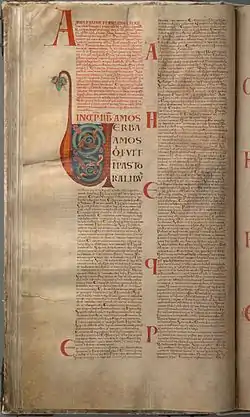Amos 3
Amos 3 is the third chapter of the Book of Amos in the Hebrew Bible or the Old Testament of the Christian Bible.[1][2] This book contains the prophecies attributed to the prophet Amos, especially God's extraordinary love, being repaid by Israel with ingratitude, of necessity calls for judgments.[3] It is a part of the Book of the Twelve Minor Prophets.[4][5]
| Amos 3 | |
|---|---|
 | |
| Book | Book of Amos |
| Category | Nevi'im |
| Christian Bible part | Old Testament |
| Order in the Christian part | 30 |
Text
The original text was written in Hebrew language. This chapter is divided into 15 verses.
Textual witnesses
Some early manuscripts containing the text of this chapter in Hebrew are of the Masoretic Text tradition, which includes the Codex Cairensis (895), the Petersburg Codex of the Prophets (916), Aleppo Codex (10th century), Codex Leningradensis (1008).[6] Fragments cumulatively containing all verses of this chapter in Hebrew were found among the Dead Sea Scrolls including 4Q78 (4QXIIc; 75–50 BCE) with extant verses 1–15;[7][8][9] and 4Q82 (4QXIIg; 25 BCE) with extant verses 1–2.[8][10][11]
There is also a translation into Koine Greek known as the Septuagint, made in the last few centuries BCE. Extant ancient manuscripts of the Septuagint version include Codex Vaticanus (B; B; 4th century), Codex Alexandrinus (A; A; 5th century) and Codex Marchalianus (Q; Q; 6th century).[12][lower-alpha 1]
Verse 1
- Hear this word that the Lord hath spoken against you, O children of Israel,
- against the whole family which I brought up from the land of Egypt, saying,[14]
- "Hear this word": Use three times in the whole book (Amos 3:1, 4:1; 5:1).[15]
- "Children of Israel": not just the ten tribes, but "the whole family brought up from Egypt"; all the descendants of Jacob, including Judah and Benjamin (cf. Jeremiah 8:3; Micah 2:3, on "family" for the nation), but the prophecy refers mainly to the ten tribes, as the majority of the nation.[3]
Verse 2
- You only have I known of all the families of the earth:
- therefore I will punish you for all your iniquities.[16]
- "Known": i.e. "known favorably, noticed, regarded": so Genesis 18:19, "I have known him to the end that he may command his children and his household after him that they may keep the way of Jehovah," etc.; Hosea 13:5, "I did know thee in the wilderness, in the land of great drought"; Psalm 1:6; Psalm 37:18, and elsewhere. Israel was the only nation whom Jehovah 'knew' in this special sense, and visited with the tokens of His friendship.[17]
- "Therefore I will punish you for all your iniquities" or "visit upon you";[18] or "against you"; in a way of chastisement and correction; the Lord was determined to make an example of them (cf. 1 Peter 4:17).[19]
Notes
- The extant Codex Sinaiticus currently does not have the whole Book of Amos.[13]
References
- Collins 2014.
- Hayes 2015.
- Robert Jamieson, Andrew Robert Fausset; David Brown. Jamieson, Fausset, and Brown's Commentary On the Whole Bible. 1871.
 This article incorporates text from this source, which is in the public domain.
This article incorporates text from this source, which is in the public domain. - Metzger, Bruce M., et al. The Oxford Companion to the Bible. New York: Oxford University Press, 1993.
- Keck, Leander E. 1996. The New Interpreter's Bible: Volume: VII. Nashville: Abingdon.
- Würthwein 1995, pp. 35-37.
- Ulrich 2010, pp. 604–605.
- Dead sea scrolls – Amos
- Fitzmyer 2008, p. 38.
- Ulrich 2010, p. 604.
- Fitzmyer 2008, p. 39.
- Würthwein 1995, pp. 73-74.
-
 This article incorporates text from a publication now in the public domain: Herbermann, Charles, ed. (1913). "Codex Sinaiticus". Catholic Encyclopedia. New York: Robert Appleton Company.
This article incorporates text from a publication now in the public domain: Herbermann, Charles, ed. (1913). "Codex Sinaiticus". Catholic Encyclopedia. New York: Robert Appleton Company. - Amos 3:1 KJV
- Barnes, Albert. Notes on the Old Testament. London, Blackie & Son, 1884. Reprint, Grand Rapids: Baker Books, 1998.
 This article incorporates text from this source, which is in the public domain.
This article incorporates text from this source, which is in the public domain. - Amos 3:2 KJV
- Joseph S. Exell; Henry Donald Maurice Spence-Jones (Editors). The Pulpit Commentary. 23 volumes. First publication: 1890.
 This article incorporates text from this source, which is in the public domain.
This article incorporates text from this source, which is in the public domain. - "visitabo super vos", V. L. Pagninus, Montanus; "visito", i.e. "visitare soleo", Mercerus; "super vobis", Cocceius; "contra vos", Piscator.
- John Gill. John Gill's Exposition of the Entire Bible. Exposition of the Old and New Testament. Published in 1746–1763.
 This article incorporates text from this source, which is in the public domain.
This article incorporates text from this source, which is in the public domain.
Sources
- Collins, John J. (2014). Introduction to the Hebrew Scriptures. Fortress Press. ISBN 9781451469233.CS1 maint: ref=harv (link)
- Fitzmyer, Joseph A. (2008). A Guide to the Dead Sea Scrolls and Related Literature. Grand Rapids, MI: William B. Eerdmans Publishing Company. ISBN 9780802862419.CS1 maint: ref=harv (link)
- Hayes, Christine (2015). Introduction to the Bible. Yale University Press. ISBN 978-0300188271.CS1 maint: ref=harv (link)
- Ulrich, Eugene, ed. (2010). The Biblical Qumran Scrolls: Transcriptions and Textual Variants. Brill.CS1 maint: ref=harv (link)
- Würthwein, Ernst (1995). The Text of the Old Testament. Translated by Rhodes, Erroll F. Grand Rapids, MI: Wm. B. Eerdmans. ISBN 0-8028-0788-7. Retrieved January 26, 2019.